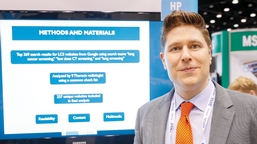Physicians discuss lung cancer screening (LCS) with patients as part of the shared decision making for the screening. Following the conversation, patients are likely to head to the internet for more information. The problem is that there is a wide variety of information about LCS on an equally wide variety of websites.

Little
Patients and providers have cited insufficient knowledge of LCS as a significant barrier to participation. A study presented Wednesday, assessed the content, multimedia structure and readability of LCS program websites of U.S. health care institutions.
"It is estimated that only 1.9% of the up to 7.6 million people eligible for lung cancer screening have been screened," said Brent Little, MD, Massachusetts General Hospital, Boston. "Knowing that the internet is a highly accessed source of information for patients, it's important to make sure the online information is correct and helpful."
Researchers reviewed the top 269 search results for websites of LCS programs in the U.S. as identified from a Google search using the terms "lung cancer screening," "low-dose CT screening" and "lung screening."
Using a common checklist, the identified websites were analyzed by a team of thoracic radiologists. The radiologists noted the text, images, videos and PDF attachments of each website.
The average grade level readability scores of the text were calculated using common web-based readability tools. Researchers found a median reading level of 10th grade on most LCS websites. Current recommendations by the American Medical Association (AMA) suggest a reading grade level of 6th grade or lower for medical information on the internet. Only four websites (1.6%) met this requirement.
Of the identified websites, 64% contained at least one image and only 23% had at least one video. Patients looking for testimonials from previously screened patients would only find those on 15% of websites.
"A wall of text, especially about medical topics, can be intimidating and difficult for patients to digest. In order to hold a reader's attention – especially in cases of complex medical content – images and videos must be included and used effectively," Dr. Little said. "Multimedia content can help a visitor understand and retain complex information and testimonials are especially powerful in influencing health decision making behavior, including cancer screening."
Only 5% of websites had content in multiple languages, while only 25% of websites had at least one link to a national LCS informational website, such as NIH (9%) or shouldiscreen.com (6%).
Researchers hope that this review of websites will prompt and guide quality improvement efforts in websites across practice settings.
"Websites should be formulated with language that is easy to understand, should contain consistent and accurate information about the basics of screening and should incorporate multimedia content designed to encourage comprehension of lung cancer screening and screening programs," Dr. Little said. "Lung cancer screening websites should be viewed as powerful opportunities for patient recruitment, engagement and education."

